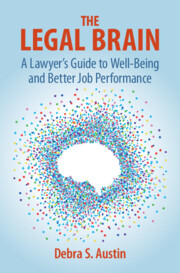Book contents
- The Legal Brain
- The Legal Brain
- Copyright page
- Dedication
- Contents
- Acknowledgments
- Introduction
- 1 The Impaired Lawyer
- 2 The Spectrum from Languishing to Flourishing
- 3 The Lawyering Culture
- 4 The Lawyer’s Brain
- 5 Memory, Knowledge, and Building Expertise
- 6 Motivation, Reward, and Developing Habits
- 7 The Impact of Stress
- 8 The Influence of Self-Medication
- 9 The Importance of Fuel
- 10 Optimizing Brain Health
- 11 Enhancing Mental Strength
- 12 Developing an Action Plan for the Neuro-intelligent Lawyer
- 13 The Neuro-intelligent Legal Organization
- Conclusion
- Select Bibliography
- Index
Introduction
Published online by Cambridge University Press: 08 May 2024
- The Legal Brain
- The Legal Brain
- Copyright page
- Dedication
- Contents
- Acknowledgments
- Introduction
- 1 The Impaired Lawyer
- 2 The Spectrum from Languishing to Flourishing
- 3 The Lawyering Culture
- 4 The Lawyer’s Brain
- 5 Memory, Knowledge, and Building Expertise
- 6 Motivation, Reward, and Developing Habits
- 7 The Impact of Stress
- 8 The Influence of Self-Medication
- 9 The Importance of Fuel
- 10 Optimizing Brain Health
- 11 Enhancing Mental Strength
- 12 Developing an Action Plan for the Neuro-intelligent Lawyer
- 13 The Neuro-intelligent Legal Organization
- Conclusion
- Select Bibliography
- Index
Summary
The legal profession worldwide is suffering from a failure of individual lawyers to thrive. The lawyer well-being crisis is impairing our performance. We must examine our culture, and we can learn from neuroscience and psychology research to improve this problem. Neuro-intelligence is a critical competency in the legal profession because lawyering is a cognitive profession and leading is a cognitive skill. Neuro-intelligence development is centered on an understanding of neuroplasticity, the brain’s superpower to constantly rewire with every action, experience, and thought; and neurogenesis, our brain’s ability to grow new brain cells. Our brain is shaped by our daily habits, and it is influenced by our efforts, successes, stressors, failures, and traumas. Lawyers must process information quickly and accurately, solve complex problems, and demonstrate resilience. A high-functioning brain is essential. This book translates scientific research into actionable information. It is designed to help law students, lawyers, and leaders of legal organizations understand how to avoid or heal cognitive damage, optimize cognitive performance, and build, maintain, and protect the most valuable tool in their briefcase, the lawyer’s brain.
Keywords
- Type
- Chapter
- Information
- The Legal BrainA Lawyer's Guide to Well-Being and Better Job Performance, pp. 1 - 8Publisher: Cambridge University PressPrint publication year: 2024

